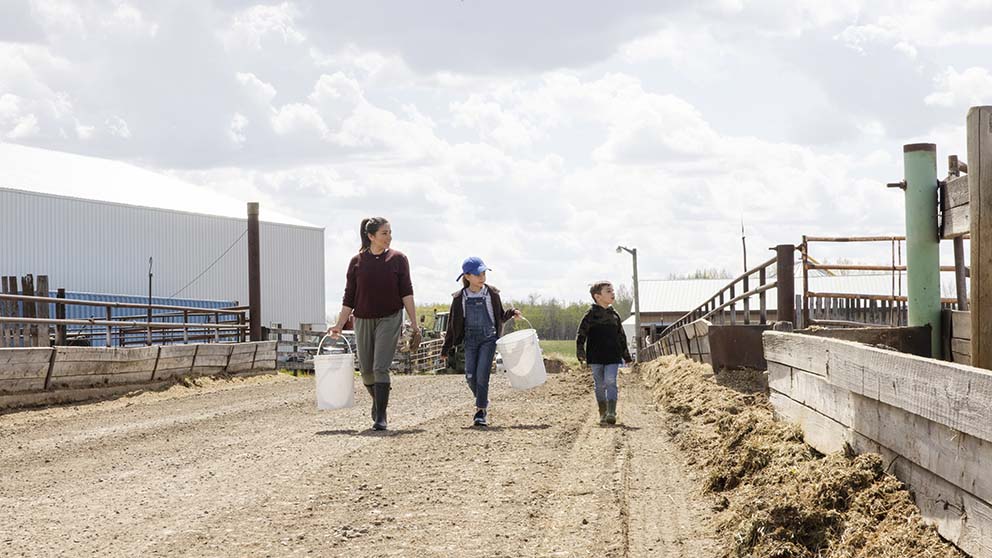Federal Bill C-208: Impact of intergenerational farm business transfers

Bill C-208 was created to amend the Income Tax Act (ITA).
Are you planning to transfer your farm business, or have you already begun the process? You may be able to take advantage of new federal regulations that give producers the same tax benefits when they sell their shares to a corporation controlled by their adult children or grandchildren as to a third party.
Bill C-208, created to amend the Income Tax Act (ITA), was adopted to facilitate the transfer of small businesses or family farms or fishing corporations. It received Royal Assent on June 29, 2021.
Applicable rules before Bill C-208
Before Bill C-208, there were tax implications for the sale of shares of a farm business to the next generation. Section 84.1 of the ITA meant that the vendor was deemed to have been paid a dividend on the disposition of shares rather than to have realized a capital gain.
“This rule prevented the transferor from using the lifetime capital gains exemption, which in 2021 was $892,218 when the sale was for qualified small business corporation shares and $1 million when it involved the disposition of a farm or fishing corporation,” explains François Bourgeois, CPA, CA, a partner at BDO’s office in Embrun and national leader of BDO’s Agriculture Livestock subsector group.
Changes brought about by Bill C-208
Bill C-208 changes this restriction. Now, a farm business operator (or their spouse) can sell shares in the business to a corporation controlled by their children or grandchildren aged 18 or older and use the capital gains exemption, thus avoiding paying tax on some or all of the gains that result from the transaction.
However, some conditions must be met:
The vendor must dispose of qualified small business corporation shares (QSBCS) or a qualified farm or fishing property (QFFP) and provide the Canada Revenue Agency with an independent assessment of the fair market value (FMV) of the shares involved, as well as an affidavit signed by the vendor and a third party attesting to the disposal of shares;
The purchasing corporation must be controlled by one or more children or grandchildren aged 18 or older, and it may not dispose of the shares purchased within 60 months of the purchase, except in the event of death.
The following property is eligible for a capital gains exemption:
QSBCS and shares of a QFFP, i.e. shares of a Canadian-controlled private corporation earning active business income;
Farm property, more specifically buildings, land and quota used by an operation, and shares of a partnership in a family farm. Some property may be ineligible depending on its use, such as biodigesters and solar panels. Furthermore, the rules regarding ownership and use apply to property purchased both before and after June 17, 1987.
Note: At least 90% of the farm corporation or partnership assets must be used for the business, and it’s considered a farm asset if owned and used for that purpose at least 50% of the time.
Forthcoming legislative amendments
To ensure that the provisions facilitate genuine intergenerational transfers, the Canadian government specified in a release issued on June 19, 2021 “that it does intend to bring forward amendments to the Income Tax Act that honour the spirit of Bill C-208 while safeguarding against any unintended tax avoidance loopholes that may have been created by Bill C‑208.”
Rules applicable in Quebec
The easing of the rules introduced by the Quebec government in 2016 allows individuals to realize a capital gain that qualifies for the capital gains exemption when certain shares are transferred to a non-arm’s length corporation. However, the rules are not harmonized with the new federal rules. Nevertheless, the Quebec Ministry of Finance announced on August 12, 2021, that the provincial tax legislation would be amended soon so that the easing of Quebec’s rules could take effect despite the introduction of Bill C-208.
The following criteria must be met for the business transfer to be eligible:
Taxpayer must be an individual and not a trust
Individual (or spouse) must actively engage in the business operated by the corporation for at least 24 months before the shares are transferred
After the share sale, the individual (or spouse):
Does not actively engage in a business operated by the purchaser or corporation
Does not have legal control of the corporation
Does not hold common or participating shares in the corporation
The total fair market value of all remaining financial interests of the transferor (shares or debt) must not be greater than:
80% of the fair market value of all the shares issued before the transfer, immediately after the share sale
50% of the FMV of all shares issued before the transfer, no more than 10 years after the transaction
After the shares transfer, at least one person involved in the share ownership of the purchaser (or spouse) must actively engage in operation of the business by the corporation
Get informed
Tax rules are complex, occasionally change and can differ from one province to another. Talk to a tax advisor to help you determine which measures apply to your situation, and the necessary steps to take advantage of the provisions of Bill C-208.
To learn more about Bill C-208, read this article from BDO Canada.
Article by: Mélanie Lagacé

Follow these nine steps to farm transition and find resources to support your success.

